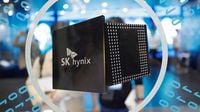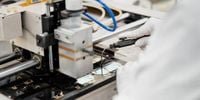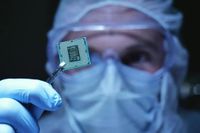On April 15, 2025, South Korea announced a substantial increase in financial support for its semiconductor industry, unveiling a new package worth $4.9 billion. This initiative comes at a critical time amid escalating trade tensions with the United States, particularly with the looming possibility of former President Donald Trump reintroducing hefty tariffs, potentially as high as 25%, on imported goods.
The South Korean government characterized this economic intervention as part of a decisive and proactive investment strategy aimed at bolstering local businesses against the growing pressures of the global market. The Ministry of Finance revealed that public investment in the semiconductor sector will rise from 18.2 billion dollars to 23.1 billion dollars, with the goal of creating a robust and innovative ecosystem driven by private initiative.
South Korea is a leading global exporter of microchips and relies heavily on trade with the U.S. Companies like Samsung, the world's largest memory chip producer, and SK Hynix are pivotal to the nation's economy. If the U.S. were to impose such high tariffs, these companies could face severe economic repercussions, jeopardizing jobs and domestic growth.
According to South Korean officials, Trump's tariff threats have already fostered an atmosphere of uncertainty, prompting local businesses to urge direct government intervention to mitigate potential economic shocks. In response, Seoul has ramped up public investments to enhance the competitiveness of its firms and support innovation, thereby reducing reliance on foreign markets and strengthening South Korea's leadership in the tech sector.
In a related effort, the South Korean government plans to expand its financial support for the semiconductor industry to 33 trillion won (approximately 20.4 billion euros) as part of its strategy to navigate the uncertainties posed by U.S. tariffs. This funding represents a 26 percent increase from the 26 trillion won announced in the previous year. Officials are emphasizing low-cost loans, subsidies, and other financial incentives to stimulate investment in the semiconductor sector.
Additionally, the government aims to facilitate the development of advanced chips by enhancing financial assistance for research and development and for high-tech production equipment. Plans also include boosting spending on industrial infrastructure, particularly covering the majority of costs for constructing underground power transmission systems in semiconductor clusters located in Yongin and Pyeongtaek, which have attracted investments from major chip manufacturers like Samsung and SK Hynix.
As South Korea races to keep pace with competitors in China and Taiwan, the government has expressed concerns that local firms may lag behind in producing high-tech chips for artificial intelligence and advanced applications. Meanwhile, Chinese competitors are rapidly closing the gap in memory chip production.
"The U.S. government has postponed reciprocal duties by 90 days. Specific tariffs for sectors such as semiconductors or pharmaceuticals are expected to be announced soon," stated South Korean Finance Minister Choi Sang-mok on Tuesday. He emphasized, "This is a crucial moment for strengthening the competitiveness of our companies in the face of a global trade war."
In a proactive measure, South Korea plans to send a delegation to the United States to discuss trade concerns with the objective of safeguarding its export-driven economy. Last week, the government launched an emergency funding program worth 3 trillion won (nearly 2 billion euros) to assist the automotive industry in coping with the impact of tariffs.
This package includes expanding low-cost financing from state-owned lenders and introducing a new financing program supported by industry giants Hyundai and Kia, alongside financial institutions, aimed at supporting struggling automakers and auto component manufacturers.
In summary, South Korea's recent decision to bolster its semiconductor industry with a significant financial package underscores the nation's commitment to maintaining its competitive edge in a challenging global landscape. As the U.S. considers new tariffs, South Korea is taking proactive steps to ensure its semiconductor sector remains resilient and innovative.




